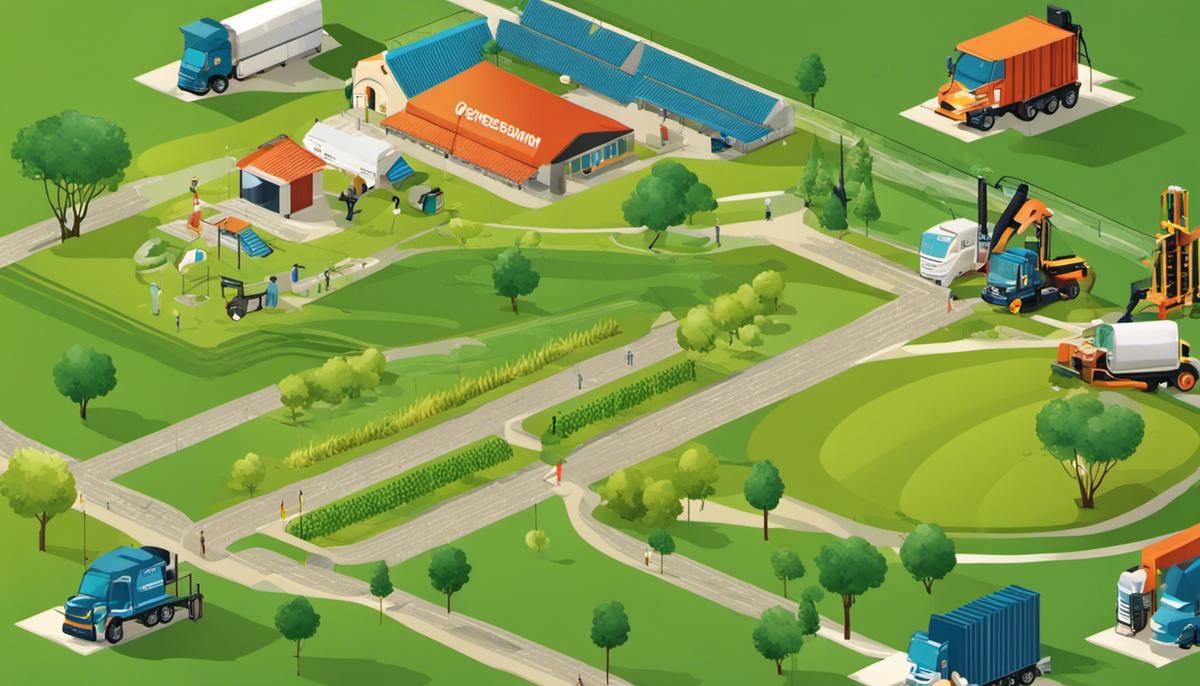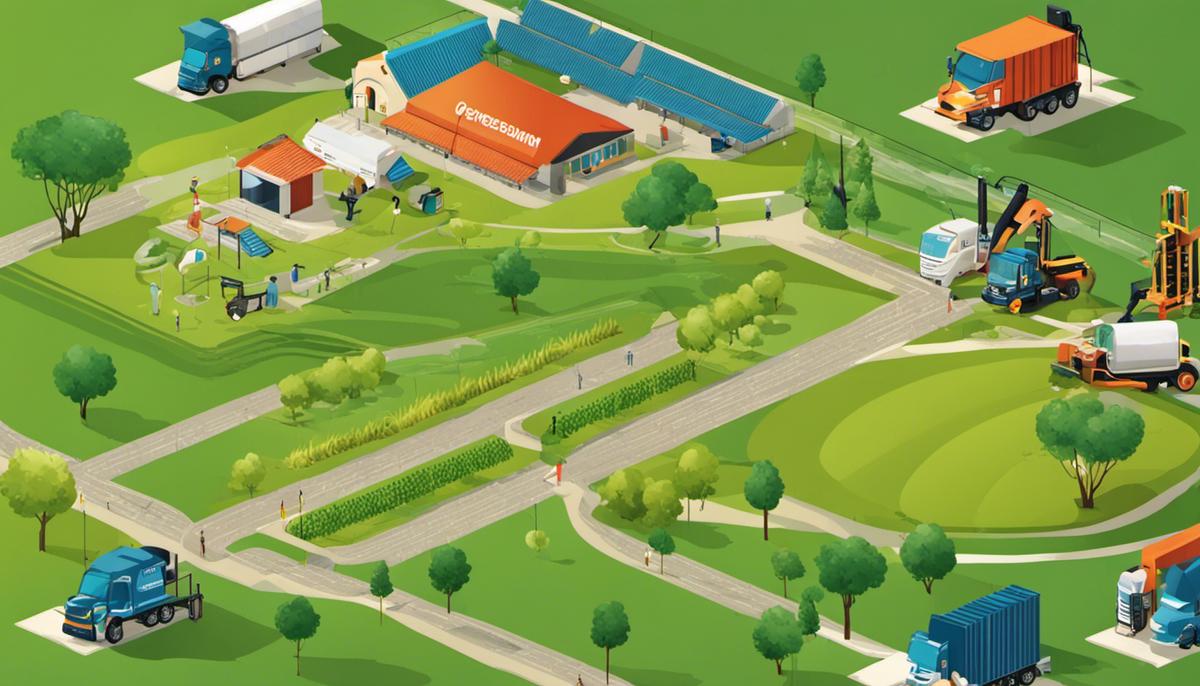

Agridisk
Egypt - Alexandria

Golden tips to succeed in agribusiness
Description: Successful agribusiness is more than just the planting and harvesting of products - it requires strategic planning, keen market insight, technological integration, and a focus on sustainability. Those who aspire to make their mark in this industry must grasp vital steps like understanding their target markets, recognising the role of technology, managing their supply chain efficiently, mastering financial aspects, and adopting sustainable practices. Stepping onto the fields of agribusiness entails an intricate blending of modern business acumen and traditional agricultural knowledge, all while considering the irreversible impacts of our actions on the environment and society. Understanding your target market is a crucial step in any business, but in the agribusiness sector, it's absolutely vital. Much more than just about sowing seed and harvesting crops, the modern landscape of agribusiness incorporates a vast array of products and services, each appealing to distinct subsets of customers with unique needs, preferences, and purchasing habits. To excel in agribusiness, you must delve deep into these customer personas to reveal what really motivates your target market. The more profoundly we understand our customers, the better equipped we are to create products and services that satisfy their needs, ultimately providing value that outpaces the competition and propels business growth. Consider these fundamental aspects of your agribusiness market: Being business savvy isn’t merely about crunching numbers and turning a profit. It’s about comprehending the market in a manner which allows you to identify untapped opportunities and enhance customer satisfaction. Understanding your target market in agribusiness isn’t just a strategy, it's a necessity. In this dynamic landscape, knowledge truly is power. Arm yourself with it, and the field of agribusiness becomes a fertile ground for entrepreneurial success. - **Futuristic Farming: A Technological Revolution In Agribusiness** The realm of agribusiness is far from static, it is in continuous evolution. How so? It comes down to the transformational influence of technology. Across all sectors, digital innovation has become an unstoppable force. Thus, it's no surprise that smart entrepreneurs are leveraging tech advances to revolutionize the agricultural sphere. This drives us towards an exciting juncture in agribusiness, where technology is not just advisable but essential. Long gone are the days when farming was limited to some rudimentary tools and the skill of the farmer. Drones are now scouting fields, GPS guided machinery are making precise operations, and sophisticated data analytics aids in making critical decisions. This layer of smart farming results in increased efficiency, productivity, and ultimately profitability. Take the world of precision agriculture for instance. This growing field employs everything from satellite feeds to on-the-ground sensors, making it possible to track and react to real-time changes in soil composition, crop growth, weather patterns, and more. This data-driven approach significantly reduces waste and cost by optimizing resource consumption. And what about hydroponic systems in indoor vertical farms? Utilizing controlled environments and nutrient solutions to grow plants without soil. Producing high crop yields in less space with minimal environmental impact. A perfect solution for areas where traditional farming is not viable. Let's not ignore the role of blockchain in agribusiness. Providing transparency and traceability thus tackling food fraud and increasing consumer trust. The implications for wholesalers and retailers alone are vast, and make solid cases for total supply chain transformation. It's high time that agribusinesses adjust their sails to the digital wind. Turning a blind eye to the tech revolution is akin to leaving money on the field. It's not merely about improving operations. Leveraging technology in agribusiness also means innovating the ways we approach, measure, and respond to challenges. An investment in tech could lead to finding novel solutions, streamlining workflows, and shaping the future of the industry. tech isn't just the future of agribusiness - it's already here. The call is to adapt, innovate, and grow. Embrace the digital revolution and unlock new pathways in agribusiness. If technology is changing the face of agribusiness, then it is wise to be at the forefront of this change. Because managing risk is central to business stability — and in agribusiness, where the stakes are as high as the sky, there's little room for playing catch-up. As you assess your agribusiness supply chain, consider how product diversification – the integral feature of expanding your product range – can resolve single-commodity dependency. This strategy not only caters to multiple customer needs but also minimizes potential challenges related to weather inconsistencies, pest diseases or market fluctuations that might adversely impact a singular product line. Additionally, the strength of relationships within your supply chain is a contributing factor to overall success. Prioritizing relationships, from suppliers to customers, can foster loyalty and enable smoother operations, despite unpredictable external factors. It's wise to integrate strategies like supplier diversity, strong alliances, and regular communication in your supply chain governance. Another significant approach in effective supply chain management is investment in human capital and talent retention. By equipping your team with continuous training on the latest farming methodologies or technologies you not only raise productivity but also drive motivation and lower turnover. Consider the environmental sustainability of your agribusiness for both societal responsibility and long-term viability. There is a growing consumer demand for environmentally responsible goods and this trend demands thorough review of your company's practices. Adapting environmentally-friendly alternatives such as renewable energy sources or sustainable packaging solutions accordingly can position your business at the forefront of green initiatives. The concept of risk management in the agribusiness supply chain is indispensable. Contingency planning to tackle possible disruptions – natural disasters or supply shortages, for instance – can be a lifeline in crisis. This may include insurance procurement or investing in buffer stock. Lastly, understanding supply chain finance is paramount. Gaining access to flexible funding options can improve payment processes and overall liquidity, representing a major competitive advantage in agribusiness where profit margins can be thin. This financial knowledge can serve as a stepping stone toward business expansion and capital investment. A dynamic approach, the continuous enhancement of your strategies and the harnessing of successful methods, not only improves the efficiency of your agribusiness supply chain but ensures its growth and sustainability in the long run. While this may seem daunting, the results will speak volumes. Invest in your supply chain. Your success depends on it. In determining the financial soundness of an agribusiness, assessing the strength, viability, and sustainability of a firm is a multifaceted process. Organizational resilience, competitive advantage, and corporate governance should be at the forefront of this evaluation. Organizational resilience is paramount in agribusiness. Preparing for unforeseen circumstances allows a business to mitigate risk and sustain disruptions with minimal operational and financial impact. Companies should implement contingency plans for potential agricultural risks, such as disease outbreaks, extreme weather conditions, and fluctuations in commodity prices. Further, a company's competitive advantage directly correlates to its financial health. For example, agribusinesses harnessing AgTech advancements to create value-added products have the potential to gain a leg up on competition. A sustainable competitive advantage leads to increased market share, which directly impacts the bottom line. Moving within the broader, the agribusiness ecosystem, we need to appreciate the evolving dynamics of buyer-supplier power. Stronger relationships with suppliers are key for bargain leverage and securing favorable contractual terms. Conversely, nurturing customer relationships through initiatives such as loyalty programs can similarly strengthen buying power and enhance revenue streams. Corporate governance is the glue binding these strategic parts together. Governance strategies emphasizing ethical standards, compliance, fiscal responsibility, and stakeholder participation can foster credibility and improve long-term financial outlook. Moreover, inclusive, diverse, and well-complemented boards synergize different industry experiences, backgrounds, and perspectives, often leading to more well-rounded decision-making processes. Finally, it is the financial metrics that give a more tangible perspective of the financial soundness. Capital expenditure, profitability ratios, return on investment, cash flow stability: these are just a few indicators that offer insight into a company's fiscal standing, liabilities, growth potential, and overall financial health. Agribusiness is volatile, complex and fast-paced, and success hinges upon developing updated strategies and aligning them with both short and long-term financial goals. It's simple: to navigate this game-changing industry successfully, one has to stay ahead, innovate, adapt, and keep a firm grasp on the financial pulse of your business. Addressing Climate Change Impact and Volatility The elephant in the room of agribusiness sustainability is climate change. Rising temperatures and changing precipitation patterns are increasing the risks and unpredictability in crop yields and livestock production. Ignoring these changes may result in failing crops and dwindling livestock, and ultimately, a downfall in the agribusiness sector. Hence, gearing up to confront and mitigate these challenges is a must for rolling into the future. Value-adding via Bio-Economy Participation Modern agribusiness should venture outside its traditional boundaries to ensure sustainability. Participation in the burgeoning bio-economy—where agricultural waste becomes a raw material for industries such as biofuel, bioplastics, and pharmaceuticals—can create new revenues streams. This valorization of waste not only aids in reducing environmental impact but also diversifies income, adding to the business's resilience. Active Participation in Policy Making Government policies exert significant influence on the agricultural sector. Active participation in policy-making can help shape these to the advantage of your agribusiness while zeroing in on sustainability. Involvement in dialogue, negotiations, and consultations leading to policy development ensures your interests are considered and incorporated. Understanding and influencing policies can become a potent tool in steering your agribusiness towards sustainability. Engaging with Consumers and the Wider Public In today's digital age, consumers are increasingly concerned about the origins of their food and the impact on the environment. Engaging with consumers, reinforcing transparency, showing an understanding and addressing their concerns can build strong relationships and loyalty. Building public trust helps secure your market position and contributes to the overall sustainability of your agribusiness. Integrating Circular Economy Principles The circular economy—with its focus on reducing, reusing, and recycling—offers an excellent model for sustainable agribusiness. Shifting away from the traditional linear model, agribusinesses can implement circular approaches, from employing regenerative farming practices, reusing waste products, reducing water use, to creating renewable energy sources from waste. In conclusion, embracing new practices, addressing climate change, diving into the bio-economy, engaging with policies, and integrating circular economy principles—all these are crucial in ensuring your agribusiness thrives into the future. However, what's most important is not just adopting these practices, but significantly ingraining them into your business model. This adaptability, inherent to entrepreneurship, will set a sustainable path for your agribusiness in the ever-evolving landscape. Adapt, innovate, and above all, sustain, because the future of your agribusiness depends on it. It's evident that the roadmap to success in the agribusiness sector is multifaceted. By remaining aware of market trends, harnessing current technology, efficiently running your supply chain, maintaining strict financial control, and operating sustainably, you can optimize your agribusiness operations. Making these strategic decisions and actions part of your daily operations will ensure your agribusiness not only survives but thrives in both local and global markets. As we venture further into a future marked by technology and an increased focus on sustainability, these skills will be increasingly crucial for every agribusiness entrepreneur. Agricultural business faces many challenges in order to succeed. Anyone who wants to start an agricultural business must interact with farmers and agricultural production factories. If this is your first time in the field of agricultural production, or you want to start, here are 6 golden tips to start and win. from agricultural business. The goal of the agricultural business is important to the success of your project, so you must determine the products and services that you want to add to the market, and this is done by defining your business plan, the costs you will pay, modern tools and means, maintenance methods, and the necessary licenses for your business to be legitimate, and insurance for your project private in the event of accidents, and finally how you will profit from it and to whom you will sell your products, and how long it takes to profit. Agricultural business no longer costs small amounts, but rather requires amounts that may reach large numbers, so you will need a financier for your project, and it may be through a loan from the bank, or through obtaining partners for your commercial and agricultural project. You must know the modern devices for agricultural business, calculate how to produce, take into account the time and place of distribution, and agree with two exporters of the products that you will produce. You must obtain the necessary licenses for your commercial project, so that all your papers are valid from the office of the Minister of Foreign Affairs, and that is if you want to export your products outside the country, then you must work to ensure that your papers are valid and ready for export. Next step, you now have an existence in the legal sense, so the next step is to transfer it to the ground, on the land that you bought or rented, on the ground create a building that achieves production for you properly, and in which materials, tools and machines for work can be preserved. Now, your business is ready, you have to make a marketing plan between you and the farmers and marketers, in order to know how you will make a profit and how long it will take, and also for your project to succeed. The last step, after you have done all the previous steps and the marketing plan is ready and you start attracting new customers, you should consider hiring employees, as agricultural business is not an individual task, and therefore you will need employees to perform the task perfectly. Please note that agricultural work individually is very hard work, and collective work and modern tools make you produce much better, so we hope that our tips will help you to start your project properly.Understanding the Market

Technological Integration

Effective Supply Chain Management

Financial Mastery

Adopting Sustainable Practices


6 golden tips to succeed in agribusiness
1. Determine what you want to produce and sell to the market?
2.Get the necessary funding for your project
3. Obtain the appropriate licenses for your agricultural business
4. Get your business off the ground
5. Develop your marketing plan
6.Hire Employees